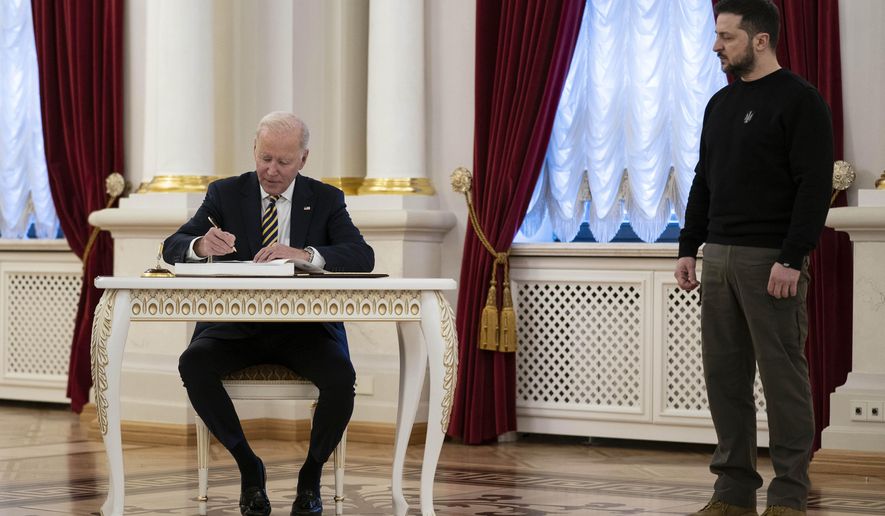Opposition to the war in Ukraine is mounting in the U.S. — one year after Russia invaded.
Many opponents cite the ever-rising cost of U.S. military aid for Ukraine without oversight or a strategy to end the conflict. Others say the money would be better spent at home on a multitude of problems that directly affect taxpayers.
As war fatigue grows, critics of continued U.S. support for Ukraine have been most prominent on the right. Last March, when President Biden initially asked Congress to approve a military aid bill for Ukraine, only a handful of House Republicans opposed the effort.
Only two months later, 57 House Republicans voted against sending an additional $40 billion in humanitarian and military assistance to Ukraine. The GOP opposition has been fueled by the party’s conservative grassroots and provocative hardline conservatives with a large social media following.
Some, like Rep. Matt Gaetz, Florida Republican, argue that it is not in the best interests of the U.S. to get bogged down fighting a proxy war with Russia when there are bigger problems at home.
“America is in a state of managed decline, and it will exacerbate if we continue to hemorrhage taxpayer dollars toward a foreign war,” said Mr. Gaetz. “We must suspend all foreign aid for the war in Ukraine and demand that all combatants in this conflict reach a peace agreement immediately.”
Other hard-line conservatives have similarly invoked former President Donald Trump’s “America first” rhetoric when making the argument. Many say that Congress should focus less on Ukraine and more on 40-year high inflation, the immigration crisis at the U.S.-Mexico border, and surging crime.
“An ’America first’ agenda would take care of our fellow citizens suffering in Ohio before sending billions more to Ukraine,” said Illinois GOP Rep. Mary Miller, noting the recent train derailment and toxic chemical fire in East Palestine, Ohio.
Mr. Trump has not joined the anti-Ukraine chorus. The former president has instead focused on lambasting Mr. Biden for not having a transparent plan to end the conflict.
The distinction is also shared by a large portion of other Republican opponents of continued U.S. support. While most GOP lawmakers say that they support Ukraine’s right to defend itself from Russian aggression, they question the strategy for the war and how U.S. tax dollars are being spent.
“What is the plan? Are we going to be there forever?” said House Freedom Caucus Chairman Scott Perry, Pennsylvania Republican. “How is aid being disseminated in a war-torn country that has been known to have a corrupt element in the past?”
Republicans say those concerns about transparency and accountability have not been met. Last year, Congressional Democrats killed a proposal to create a special inspector general to oversee the disbursement of aid to Ukraine.
Hardline conservatives attempted to pass a provision in a funding bill to create such an office. It was ultimately rejected by a bipartisan margin over timing concerns.
“Whether you support Ukrainian funding or not, the fundamental question is the American people deserve to know how their money is being spent, especially when we’re talking about $120 billion of it,” said Sen. J.D. Vance, Ohio Republican.
While much of the opposition to continued support for Ukraine has come from the right, there are also signs of movement from the traditional anti-war left.
Many on the left argue that the U.S. is hurtling toward a confrontation with a nuclear power by its continued support of Ukraine. Much of the left-leaning argument is wrapped up in talk of nuclear disengagement.
“This proxy war that we’re fighting against Russia right now could turn at any moment into a direct conflict between the United States and NATO and Russia, a country that has more nuclear weapons than any other in the world,” said former Hawaii Rep. Tulsi Gabbard.
Ms. Gabbard, a one-time Democrat who challenged Mr. Biden for the 2020 White House nomination, was a keynote speaker over the weekend at the Rage Against the War Machine rally in Washington. The event was put on by a constellation of libertarian and far-left groups.
• Haris Alic can be reached at halic@washingtontimes.com.




Please read our comment policy before commenting.